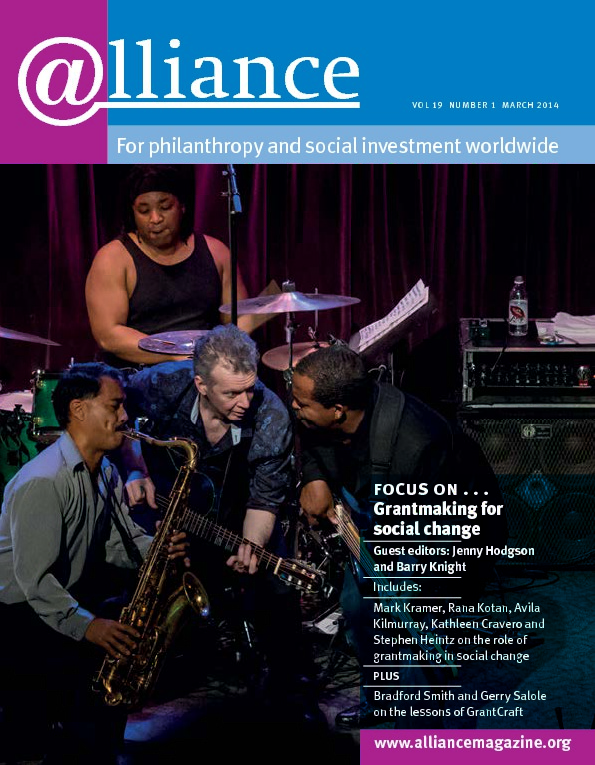The first time I got a grant in 1986, I was delighted beyond words. I felt like hanging a small poster around my neck exclaiming: ‘I got a grant!’ It was for an action-research project to prepare the ground for primary healthcare reforms in Africa. It was for transformative and enduring social change.
The good news is that there are now many more philanthropic players and many more tools in the toolbox than ever before. The not-so-good news is that grantmaking is seen less and less as a proven strategic tool for producing social change, with many philanthropic leaders downplaying the importance of grantmaking for a variety of reasons. At the African Grantmakers’ Network conference in November 2012, a prominent keynote speaker bemoaned the use of the word ‘grantmaker’ in its name by a network of African philanthropic institutions that should stand for social justice and change.
To be sure, grantmaking can be, and has often been, misused. The grant approval process can strip a grantseeker of any professional dignity. Grant letters can read like a contract whose breach would produce an outcome worse than capital punishment. Some civil society organizations (CSOs) develop a fatal dependency on a small circle of grantmakers. Strategically, however, there is no more game-changing tool than grantmaking. Five examples from Africa will back up this view.
First, about 20 years ago, in the early 1990s, foundations began making grants to African CSOs, which significantly helped to build a solid movement for democratic transition across the continent. In West Africa, for example, the transition from military and single-party dictatorships greatly benefited from the Ford Foundation’s sustained grantmaking to CSOs and leaders, especially those working for media pluralism, human rights advocacy, governmental accountability and participatory local governance. In post-conflict societies, such as Liberia and Sierra Leone, grants programmes have been the bedrock of support for leaders building sustainable peace.
Second, some grantmaking foundations have played a catalytic role in transforming the African philanthropic landscape over the past 15 years through major grants to support the emergence of African social justice foundations. These include the Kenya Community Development Foundation, the African Women’s Development Fund, the Uthungulu Community Development Foundation, Akiba Uhaki, the Foundation for Civil Society in Tanzania, Urgent Action Fund-Africa and TrustAfrica. Why is this important? Because the best way you can help a people is to help them own and secure the institutions that they need. That is the first step in achieving a paradigm shift in our field.
Third, because grantmaking has a healthy risk element, it is more likely to spur innovation than other forms of support. Innovations in early learning, agricultural systems, attitudes to health and HIV-AIDS have all brought transformative changes that grants have helped to initiate throughout Africa.
Fourth, at the continental level, grants have enabled cross-national CSOs and networks to help make the inter-governmental treaty systems for peace and security and non-impunity for atrocities more effective and people-centred. For a continent that has for long been unstable, this role holds great transformative potential for heightened social justice. Step by step, Africa is becoming more than the sum of its parts. Its future role in the global scheme can only become more constructive when its CSOs manage to cross borders to bridge and bond.
Finally, thanks to some notable capacity-building grants, the landscape of think-tanks and policy institutes is changing for the better. The multi-donor Think-Tank Initiative is one example of how grantmaking has significantly helped to build African ownership of development policymaking as well as elevating the quality and relevance of policy research on a continent that has had more than its fair share of external influence on policy formulation.
So what is the main lesson? For things like fostering scalable social change and catalysing innovation, grants are simply the best means. While the continued invention and testing of new philanthropic tools is vital, the community must continue to troop and plough the trough with the time-tested tool of grantmaking for the sake of social change, social justice and ownership. The revolution can be funded!
Akwasi Aidoo is chief executive of TrustAfrica. Email aidoo@trustafrica.org






Comments (0)